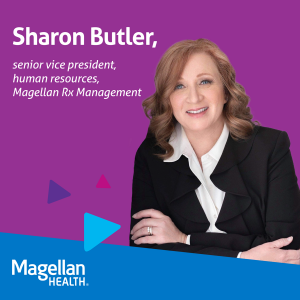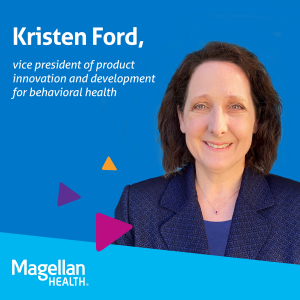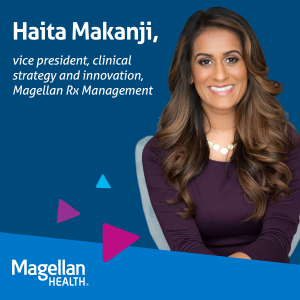Sharon Butler is our leader of people strategies at Magellan Rx Management and is an integral part of our thriving culture. She inspires our teams to use their strengths to overcome challenges and deliver a pharmacy experience unlike any other. We sat down with Sharon to talk about her love of human resources, the current state of the industry, how the pandemic has affected HR professionals and how people make the difference in any organization.

What’s your background, and how did you get into Human Resources?
I love sharing this story because it’s the last place I thought I would be. I grew up in a poor neighborhood in Albany, NY in a family that didn’t value education. It wasn’t until I had the opportunity to attend college later in life that I met so many people who were resetting their path and going back to school after finding themselves in a job that didn’t fulfill them. It was then and there I realized my passion for people and believe there is so much more to illuminate a person if they are exactly where they want to be versus where they can be.
This realization led me to study organizations and leadership, dedicating my career to understanding the power of giving people an opportunity to do great things. There’s not an organization out there that’s great because of something other than people. If you think about it, organizations can’t achieve anything without people driving change.
How do you think your life experiences have shaped your work as a Human Resources professional?
I have learned through personal experience that some of the hurdles in your life are the ones you create and put in your own way. You can do anything if you have the passion and power to do it. You can’t just dream it. A dream isn’t a strategy, it’s the motivation that pushes you forward.
I’ve also learned that your career can have a huge impact on your overall wellbeing.
I have now been with Magellan for 14 years, and I’ve seen firsthand that when you tap into someone’s personal strengths, you unleash an incredible amount of potential within not only yourself, but your team as well. As a leader or manager, placing people in the right seat creates a highway for growth and development.
Our data tells us that we’ve had 455 internal promotions over the last 12 months and that we continue to focus on supporting effective career conversations and encourage every employee to start a conversation. I’ve seen a correlation between employee driven career discussions and success of achieving aspirational goals.
We can’t impact what we don’t measure. We are focused on pulsing engagement and investing in what makes our employees feel valued. Our pulse surveys provide us with data for leaders to use to ensure they are having the impact intended. This is one tool that should be used with a variety of tools to ensure we continue to understand each other regardless of role. These surveys allow us to have impactful conversations to gauge overall organizational wellbeing. Now that we are far more virtual than ever before, we must continue to create connectedness, check in with each other in a variety of ways and respond to the ever-changing climate of our work.
How has the pandemic impacted Human Resources professionals?
HR professionals have really had to stretch outside their comfort zones, beyond the predictable outcomes they are used to. What we’ve all seen happen over the last few years in our communities with regulations, politics, human behaviors and attitudes changing is also happening within organizations. We can’t build a policy to navigate it, we must lean in and care about it.
We have had to consider every perspective to make the right decisions for us as an employer, and to make the right recommendations for employees as one size does not fit all. While some organizations have used this as an opportunity to be defined by their policies, we’ve found that we’re too complex and dynamic to pick one side or another on many points related to the pandemic. The passionate people at Magellan Rx are navigating through every circumstance in the most caring way possible.
These last few years have impacted everyone. Leaders, managers and employees are recognizing the need to practice self-care first before care for others. I’ve been starting my day with MAGIC Mornings, which I’ve recoined for myself ‘Miracle Mornings,’ this practice affords me a margin of time to focus on myself and set my day through exercise, meditative prayer, affirmational writings, gratitude journaling and intention or goal setting. I’ve been doing this for four months now and have noticed a complete shift in how I approach and move throughout my day. I encourage teams and individuals to rethink how they start their days and prioritize their wellbeing to avoid burnout.
What’s your perspective on the Great Resignation?
My observation of what the data suggests is that people are reacting to what adds value to their lives. The notion of an employee leaving their job, and possibly their career, is changing attitudes and expectations. Employees have more of a voice than ever before in what they are willing to do, and not do, for a paycheck. We need to listen.
Do you think organizational culture plays a role in the Great Resignation?
Absolutely. For a long time, organizations have been trying to define an attractive culture with policies and programs like education reimbursement, wellness credits and unlimited PTO. What we are seeing during this Great Resignation is a shift in focusing on employee’s wellbeing and how they are treated. Cultures are formed by how leaders behave and employees feeling truly valued. It isn’t about a program; it’s about behavior.
What we’ve noticed at Magellan is that while our turnover rate has inched up, it isn’t at the national average, and we are still able to attract talent to our positions. We believe that this is a direct reflection of our strong culture of caring people who are leveraging their strengths in their everyday work and modeling positive behaviors.
What do you think is needed to create a thriving culture?
First and foremost, authenticity and accountability from leaders. Then, you must focus on people because people make the difference. You do this by unlocking their strengths and unleashing their potential. Mix that with a little fun, and you’ve got a solid foundation to build a thriving culture.
Our secret sauce at Magellan Rx is that we don’t have a one size fits all strategy for any person. We start by focusing on an individual’s core strengths, which allows leaders and employees to deploy very tailored career development, growth performance and learning opportunities.
How do you think teams have remained resilient these last few years while some haven’t?
I think there is a lot of masked resiliencies happening right now – pushing through versus truly evolving through the challenges – which can be very dangerous because it means we are closer to burnout than we know.
You can tell resiliency is occurring when you are faced with the next challenge, and it energizes you because you learned from the last challenge and are able to use your learnings to evolve through the next obstacle.
For those that haven’t, do you have any advice?
There is no time like the present to pause and take inventory of all the things that you have pushed through, map those things to what you have learned, and really understand the impact of your work. When you are focused solely on what’s ahead and what’s not done, you deprive yourself the opportunity to pause and learn. Look back at the path you’ve laid and the wake you’ve made.
What should organizations do to invest in their people?
Create safe spaces and support systems for employees to stretch, learn and grow in their careers.
Think about their world, their environment and what they are trying to transform. Don’t forget to ask their opinion on what great looks like and listen, because at the end of the day it’s the people who make the difference in any organization.


